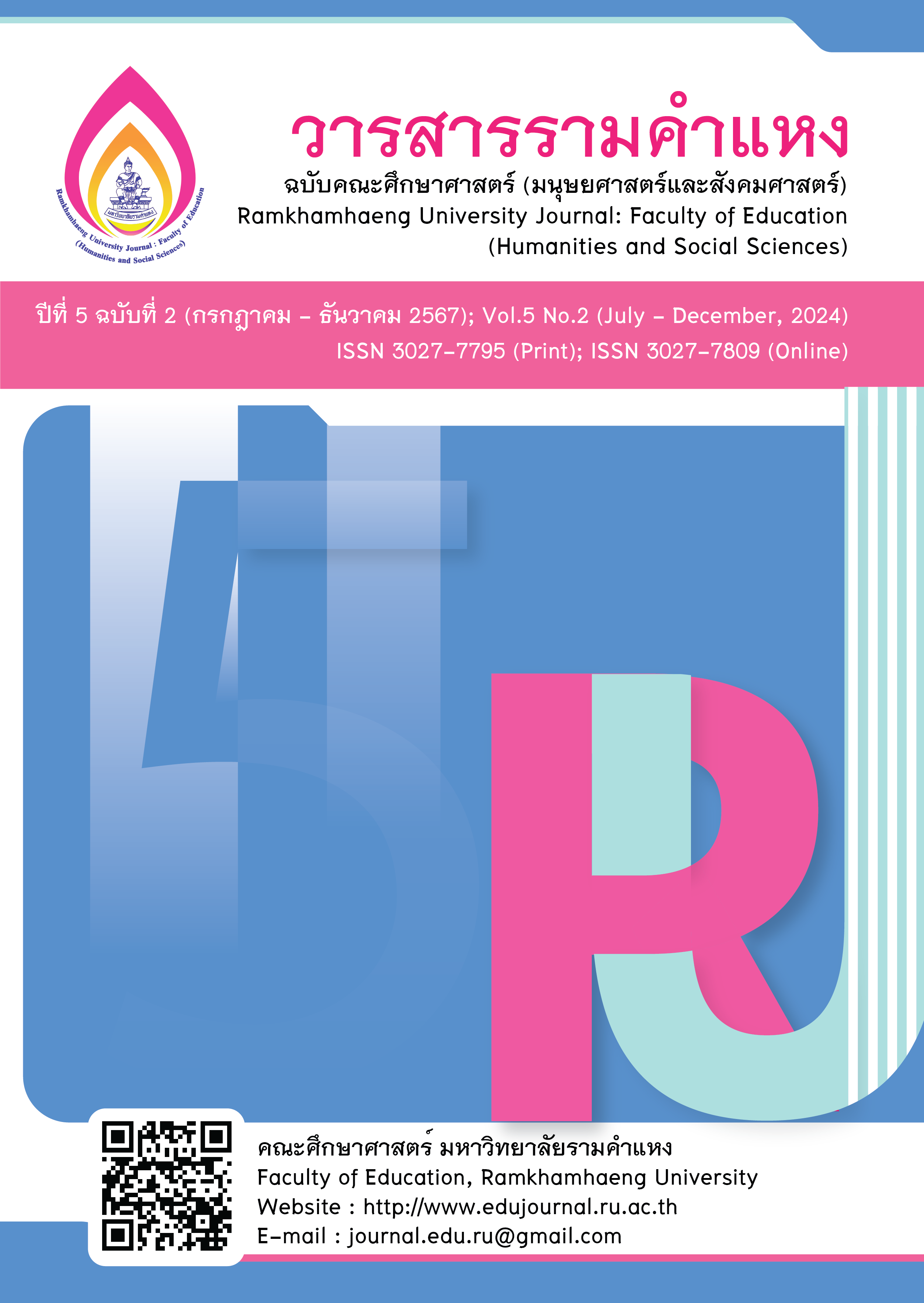การพัฒนาผลสัมฤทธิ์ทางการเรียนโดยใช้การจัดการเรียนรู้แบบห้องเรียนกลับด้านร่วมกับเกม รายวิชาคณิตศาสตร์ เรื่อง รูปเรขาคณิตสามมิติ สำหรับนักเรียนชั้นประถมศึกษาปีที่ 6
Main Article Content
บทคัดย่อ
การวิจัยนี้มีวัตถุประสงค์เพื่อ (1) เปรียบเทียบผลสัมฤทธิ์ทางการเรียนระหว่างก่อนเรียนและหลังเรียน โดยใช้การจัดการเรียนรู้แบบห้องเรียนกลับด้านร่วมกับเกม (2) เปรียบเทียบผลสัมฤทธิ์ทางการเรียน กับเกณฑ์ร้อยละ 70 และ (3) ศึกษาความพึงพอใจที่มีต่อการจัดการเรียนรู้แบบห้องเรียนกลับด้านร่วมกับเกม รายวิชาคณิตศาสตร์ เรื่อง รูปเรขาคณิตสามมิติ กลุ่มตัวอย่าง ได้แก่ นักเรียนชั้นประถมศึกษาปีที่ 6 โรงเรียนจ่าการบุญ จำนวน 44 คน ซึ่งได้มาจากวิธีการสุ่มตัวอย่างแบบกลุ่ม (cluster random sampling) เครื่องมือที่ใช้ในการวิจัย ประกอบด้วย (1) แผนการจัดการเรียนรู้แบบห้องเรียนกลับด้านร่วมกับเกม จำนวน 8 แผน (2) แบบทดสอบวัดผลสัมฤทธิ์ทางการเรียน เป็นแบบทดสอบปรนัย จำนวน 10 ข้อ อัตนัย จำนวน 2 ข้อ และ (3) แบบสอบถามความพึงพอใจที่มีต่อการจัดการเรียนรู้แบบห้องเรียนกลับด้านร่วมกับเกม สถิติที่ใช้ในการวิเคราะห์ข้อมูล ประกอบด้วย ค่าเฉลี่ย ส่วนเบี่ยงเบนมาตรฐาน และสถิติทดสอบค่าที (t test) ผลการวิจัยพบว่า ผลสัมฤทธิ์ทางการเรียนหลังเรียนสูงกว่าก่อนเรียน และหลังเรียนสูงกว่าเกณฑ์ร้อยละ 70 อย่างมีนัยสำคัญทางสถิติที่ระดับ .05 และนักเรียนชั้นประถมศึกษาปีที่ 6 มีความพึงพอใจต่อการจัดการเรียนรู้แบบห้องเรียนกลับด้านร่วมกับเกมในภาพรวมอยู่ในระดับมากที่สุด
Downloads
Article Details

อนุญาตภายใต้เงื่อนไข Creative Commons Attribution-NonCommercial-NoDerivatives 4.0 International License.
ผู้ส่งบทความ (และคณะผู้วิจัยทุกคน) ตระหนักและปฎิบัติตามจริยธรรมการวิจัยอย่างเคร่งครัด ทั้งนี้บทความ เนื้อหา ข้อมูล ข้อความ ภาพ ตาราง แผนภาพ แผนผัง หรือข้อคิดเห็นใดๆ ที่ปรากฎในบทความ เป็นความคิดเห็นและความรับผิดชอบของผู้ส่งบทความ กองบรรณาธิการไม่จำเป็นต้องเห็นตามเสมอไป และไม่มีส่วนรับผิดชอบใดๆ โดยถือเป็นความรับผิดของของเจ้าของบทความเพียงผู้เดียว
เอกสารอ้างอิง
Arreerard, P. (2008). Educational software development. Apichat Publication Company Limited. (in Thai)
Boontanom, A. (1999). A comparison of mathayom suksa I students' learning achievement attitude and learning retention in mathematics through the discovery method by using games and methods in the teacher's manual. [Master thesis, Srinakharinwirot University]. (in Thai)
Chaireag, P. (2008). A study of learning achievement and mathematical process skills of prathomsuksa 5 students using mathematics games with small ground activities. [Master thesis, Thaksin University]. (in Thai)
Duangtod, Y. (2018). Learning management by using the flipped classroom approach for enhancing
learning achievement in mathematics for secondary 3 (Grade 9) students. [Master thesis, Rajamangala University of Technology Thanyaburi]. (in Thai)
Educause. (2012). 7 things you should know about flipped classrooms. Boise State University. https://www.boisestate.edu/ctl-flipping/publications/7-know/.
Erikson, E. H. (1980). Identity and life cycle. Norton.
Ingram, D., Wiley, B., Miller, C., & Wyberg, T. (2014). A study of the flipped Math classroom in the
elementary grades. [University of Minnesota]. https://dokumen.tips/documents/a-study-of-the-flipped-math-classroom-in-the-iste-study-of-the-flipped-math-classroom.html?page=1.
Khammanee, T. (2001). Teaching methods for professional teacher. Bangkok : Text and journal
publication company limited. (in Thai)
Meelah, N. (2003). The effect of games in mathematics teaching on polynomial for mathayomasuksa 1 students at Satrinakhonsawan school. [Master thesis, Nakhon Sawan Rajabhat University]. (in Thai)
Naiyachit, T. (1998). Development of learning achievement with game for the mathematics. Academic Journal, 1(5), 62-65. (in Thai)
Pahea, S. (2013). The flipped classroom: New classrooms dimension in the 21st century. Flipped classroom2. http://www.mbuisc.ac.th/phd/academic/flipped%20classroom2.pdf. (in Thai)
Piyawat, J. (2014). Flipped classroom. Piyanutphrasongo25. https://piyanutphrasong025.wordpress.com. (in Thai)
Pongsawat, P. (2017). The development of learning a flipped classroom through a scientific inquiry
learning on smart phone for undergraduate student. [Master thesis, Muban Chombueng Rajabhat University]. (in Thai)
Sriphom, S. (2001). Instructional game. Academic journal, 4(5), 73-75. (in Thai)
Wantum, L. (2012). The development of the mathematics learning achievement under the topic of
“Ratio and Percentage” of Matthayou Suksa 2 students by games instruction. [Master thesis, Valaya Alongkorn Rajabhat University]. (in Thai)


